DO-IT News March 2017

Volume 25, Issue 2
Below are the articles of the DO-IT News March 2017 newsletter. These articles can also be seen all on one page at the Full Newsletter option.
Director's Digression: The Ed-ICT International Network
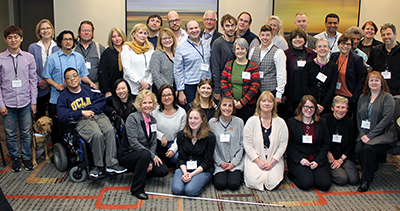
DO-IT has a long history of working internationally to promote the success of people with disabilities in college studies and careers; the development and use of technology for people with disabilities; and the promotion of universal design of instruction, physical spaces, technology, and services.
DO-IT is partnering with organizations from across the world in the Ed-ICT International Network, which will collaborate over the next three years and is hosting five symposiums: The first of which was in Seattle, entitled Disabled Students, Information and Communication Technology (ICT), Post-Compulsory Education and Employment: In Search of New Solutions. The symposium focused on effective models, frameworks, and approaches to improving the inclusion of students with disabilities in postsecondary education and challenging careers, especially on those that impact the development, deployment and use of ITC.
During the event, presenters discussed different frameworks and how they can be used to transform institutional practice. Participants were divided into small groups to discuss important questions:
- What evidence is there that universal design is effective in various applications and contexts and with a variety of stakeholders? Can this model inform the practice of all relevant stakeholders within post-compulsory education?
- What other models, frameworks or approaches exist and which stakeholders are they aimed at?
- How do various models, frameworks or approaches translate into practice?
DO-IT will continue to work in the Ed-ICT International Network to raise awareness for accessibility and explore the role that ICTs play (or could play) in creating or removing barriers for students in post-secondary education. The network will also examine how practices of educators and other stakeholders can craft successful and supportive relationships between learners with disabilities and ICT.
AccessERC Capacity Building Institute
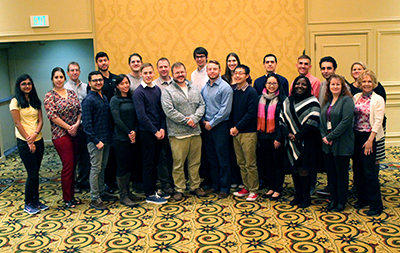
On January 24-26, AccessERC hosted its second capacity building institute, titled Increasing the Participation of People with Disabilities in Engineering Research Centers (ERCs).
Members of ERCs from across the nation participated to learn more about including students with disabilities in their centers. Participants learned about best practices for including people with disabilities, such as
- recruiting individuals with disabilities,
- applying universal design principles,
- providing accommodations for engineering activities,
- understanding disability culture and disability rights, and
- making sure that information technology and websites are accessible.
Participants visited an engineering lab where they learned how to evaluate accessibility using the DO-IT publication “Checklist for Making Engineering Labs Accessible to Students with Disabilities”.
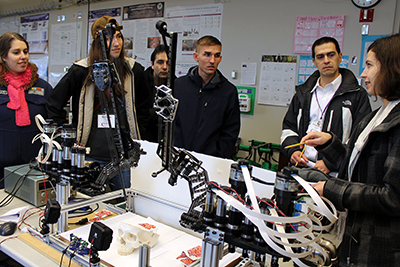
The participants continue conversations online, in the AccessERC community of practice, where they talk about increasing the engagement of people with disabilities in ERCs.
The National Science Foundation funds ERCs, where postsecondary researchers and industry collaborate on complex engineered systems and technologies that could spawn whole new industries or radically transform existing ones. AccessERC is a collaboration between DO-IT and an ERC at the University of Washington called the Center for Neurotechnology (CNT). Dr. Rajesh Rao, CNT Principal Investigator, shares “ERCs are designed to have huge impact in society by solving some of the major challenges in engineering that society is currently facing. In order to have that kind of impact and solve these important problems, we need to include every section of society, including people with disabilities, in all aspects of ERCs.”
Staff Profile: Gaby de Jongh
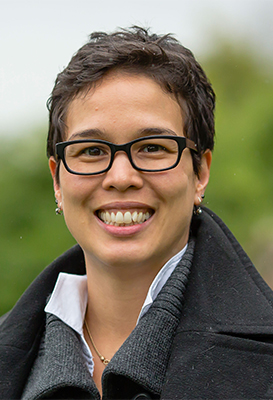
Hello, my name is Gaby de Jongh, and I am an IT Accessibility Specialist for Accessible Technology Services (ATS). My role at ATS is to work with different units and departments across the three University of Washington campuses and lead the initiative to ensure the accessibility of electronic documents for students, staff, faculty, and the general public. My main responsibilities include outreach, training and capacity building, and being a resource to units for accessible document creation and remediation.
I received my undergraduate degree in Speech/Language Pathology & Audiology from Oregon State University and started my graduate studies at Washington State University in Speech and Hearing Sciences. After my academic studies, I began working in reprographics and desktop publishing and became a technology trainer for private industry. I eventually changed careers and started working for a startup in Seattle as part of the instructional design and rapid prototyping teams for an online learning and reading program.
In 2002, prior to joining DO-IT and Accessible Technology Services, I worked as a training coordinator for AccessIT, a former DO-IT program. I collaborated with Sheryl Burgstahler and her team on promoting accessible information technology in education. Later, I became an assistive technology specialist for the Assistive Technology Act program for the State of Washington, where I performed device demonstrations of assistive technology, completed evaluations for deaf/blind clients, and presented to vocational rehabilitation counselors on topics related to assistive technology, transition, and rehabilitation medicine.
I am a native Pacific Northwesterner, born and raised in Portland, Oregon and living in Seattle since 1996. I am an active practitioner of Eastern philosophy and yoga, though I can honestly say my mind is a lot more flexible than my body. I also enjoy traveling to remote destinations, hiking and camping in the beautiful Pacific Northwest, and snuggling with my cat (when she allows me to).
Lights, Camera, Action!
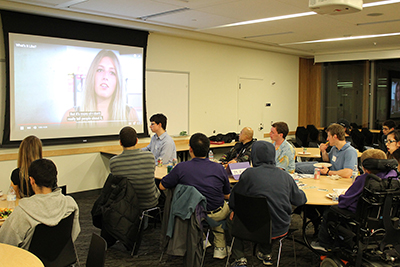
DO-IT has a long history of producing videos that promote the full inclusion of individuals with disabilities of all aspects of society—especially education and employment. We’ve come a long way on this journey. In our early days, we would hand out VHS tapes to educators, employers, and policymakers. We enjoyed the switch to producing our own videos on DVDs, which are much lighter, have better quality, and are easier to replicate. Around that same time, we began hosting videos online as our primary platform for dissemination. Today, DO‑IT videos play in a custom accessible media player with audio description and transcripts provided. They can also be downloaded, viewed on DO-IT’s YouTube channel, or ordered on DVD.
DO-IT currently has over 20 new videos in production! Our camera crew is busy at conferences, on college campuses, out in the community, and at our annual Summer Study program. New titles include the following:
- Technology Advancements and Disability Identity
- Leading the Way: Computing Students and Professionals with Disabilities
- Accessibility in Computing Courses
- Disability Disclosure in the Workplace
- DO-IT Scholars Discuss the Importance of College
- Quality Instruction Includes All Students
DO-IT welcomes strategies for new videos, especially those that provide practical information to broad audiences and those that suggest solutions to access barriers. Video ideas can be sent to doit@uw.edu. In the meantime, get out the popcorn! DO-IT’s full video library can be accessed here.
Teaching Accessibility
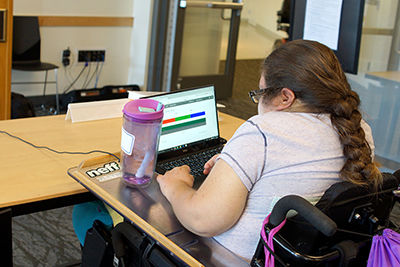
AccessComputing started a new initiative last year to integrate relevant disability, accessibility, and universal design content into computing courses to increase knowledge and skills among future computing professionals. This will lead to a workforce that is aware of and more capable of addressing accessibility barriers. As part of this effort Amy J. Ko and Richard Ladner published a paper titled “AccessComputing Promotes Teaching Accessibility” in ACM Inroads magazine, a major venue for publishing computer science education practice articles. The article showcases why teaching accessibility is important for today’s students in computing fields. A major argument is the demand for computing professionals with knowledge of technologies that support access for people with disabilities, as documented by the Teach Access initiative.
The article gives examples of strategies to include accessibility and disability topics in courses, either as part of a lecture, an entire lecture, or an entire course. There are already capstone courses that focus on accessibility at MIT, Stanford, Duke, and University of Washington (UW). The article closes with the description of how accessibility was integrated into a web design and development class in the Information School at the UW.
Another article, “Best Practices for Teaching Accessibility in University Classrooms: Cultivating Awareness, Understanding, and Appreciation for Diverse Users,” by Cynthia Putnam, et al. was published in ACM Transactions in May 2016. The article presents a qualitative study of practice teaching accessibility at the university level. The study is based on interviews with 18 practitioners who included accessibility topics in their courses.
At the 2017 ACM Special Interest Group on Computer Science Education (SIGCSE) Conference, Richard Ladner and Matt May from Adobe presented a special session titled “Teaching Accessibility.” The session presented content about accessibility that can be included in many courses that stress application and/or web development.
Native Americans and Mental Health
A 2012 study revealed that Native American adults had one of the highest rates of mental illness compared to White, Black, Asian, and Hispanic adult populations. Native Americans indicated a high rate of using mental health services, prescription medication, and outpatient treatment compared to their counterparts. Native Americans experience higher rates of posttraumatic stress disorder and alcohol dependence. (www.integration.samhsa.gov/MHServicesUseAmongAdults.pdf).
Reasoning for these disparities in Native communities have been theorized to stem from historical trauma.
Historical trauma is the emotional and psychological wounding of a people caused by past generations. Some Native Americans have dealt with being stripped of their land, genocide of their people, and attempts to eliminate their cultural, ceremonial, and spiritual practices. These experiences have led to family histories of depression, substance abuse, and posttraumatic stress disorder. (tpcjournal.nbcc.org/examining-the-theory-of-historical-trauma-among-native-americans/).
Despite these misfortunes, Native communities have been healing by reclaiming their cultures and traditional ways of life. Ceremonies and rituals are being practiced to reduce the trauma Native people have faced historically and in their daily realities. Some practices have been incorporated into mainstream medicine to reduce harmful effects from trauma. (indiancountrymedianetwork.com/culture/health-wellness/healing-historical-trauma-through-promoting-traditional-culture-in-mainstream-medicine/).
Devising ways to provide more help for mental illness within Native communities should include Native people themselves. Representation of more Native counselors, mental health providers, and doctors is desirable. Reclaiming their land, and culture and addressing the trauma of the past legacy of colonialism has and always will be in their practices and every day life.
Award for AccessComputing Student
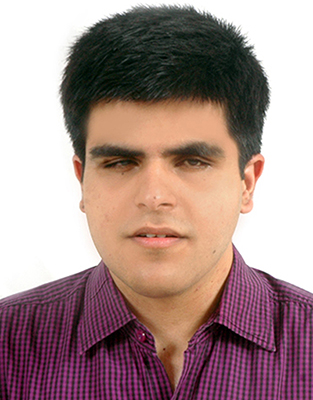
AccessComputing Team Member Kartik was awarded one of the 2016 Queen’s Young Leaders Award from Queen Elizabeth. “The Queen’s Young Leader Award recognises and celebrates exceptional people aged 18-29 from across the Commonwealth, who are taking the lead in their communities and using their skills to transform lives.”
Kartik, a senior at Stanford University majoring in computer science, is interested in artificial intelligence and human computer interaction. He’s held a variety of internships including internships with both IBM Research and Microsoft Research. He also co-founded NextBillion.org, an organization that connects people with disabilities with industry leaders, who can support them professionally with the goal of improving diversity and accessibility in the global community. Congratulations, Kartik!
AccessComputing Helps Connect Students with Disabilities with Internships
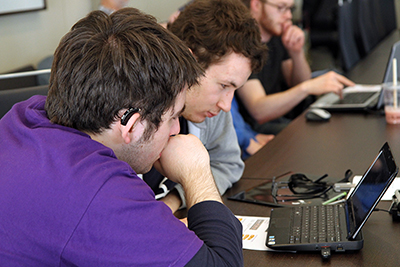
It’s the time of year when many students start to think about summer internships. Research and industry internships are a great opportunity to gain hands on experience in a specific computing field as well as bulk up one’s resume. For an undergraduate student, internships can look great on graduate school applications as well as for potential career applications.
AccessComputing, a National Science Foundation funded project, aims to increase the participation of people with disabilities in computing careers, provides funding for students with disabilities to participate in summer research and industry internships. Students interested in an internship are encouraged to apply online. Students will become a part of the AccessComputing team, gaining online mentoring and the opportunity to receive funding for internships, travel to conferences, and tutoring.
For more information on summer internships or to learn more about AccessComputing, visit our website or contact Kayla Brown at kayladb@uw.edu.
UW-IT Liaisons Meeting
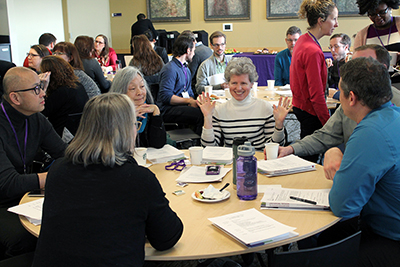
On February 2nd, Accessible Technology Services (ATS) hosted a University of Washington (UW) IT Liaisons meeting, focused on promoting accessibility across campus. The volunteer liaisons are charged with attending three half day meetings per year, communicating in an online community of practice, continually learning more about accessible design of IT, and promoting the accessible design of IT that the UW procures, develops, and uses. This group is key in helping us meet our ethical and legal obligations under federal law to make our services accessible to faculty, students, staff and visitors with disabilities and under the new Washington State Policy #188 on accessibility.
Our first liaisons meeting covered a background on ATS, the legal issues at hand, and UW’s policy, guidelines, checklist, and other resources, including the UW’s accessibility website. The meeting also hosted a panel of all the ATS support team, who answered questions on their roles and what resources were provided to liaisons and campus departments.
Meeting notes will soon be available online. To see other resources here.
Universal Design in Higher Education: Promising Practices Call For Articles
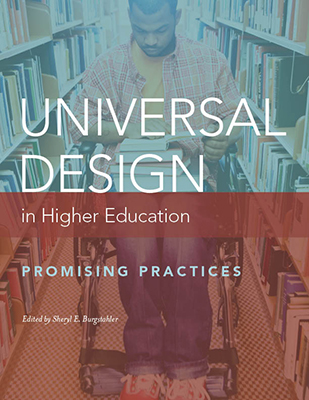
In DO-IT’s online publication, Universal Design in Higher Education: Promising Practices, practitioners share promising practices related to the application of universal design in postsecondary education settings. This collection of promising practices complements the more general content in the printed book, Universal Design in Higher Education: From Principles to Practice, which recently published a second edition under Harvard Education Press.
This complementary publication is available freely online. It can be freely copied and distributed as a book or in part for noncommercial, educational purposes. The collection will continue to grow as more articles are submitted.
Articles may be submitted at any time to udhecop@uw.edu. Submitted articles should include specific ways practitioners and researchers have applied universal design in postsecondary settings along with evidence of success. They are peer-reviewed by members of the Universal Design in Higher Education Community of Practice, and if accepted, edited by DO‑IT. Articles selected for the online resource are freely available on our website. Authors must agree to these conditions while retaining copyrights to their individual contributions. For author guidelines, consult the preface of the book.
About DO-IT
DO-IT (Disabilities, Opportunities, Internetworking, and Technology) serves to increase the successful participation of individuals with disabilities in challenging academic programs and careers, such as those in science, engineering, mathematics, and technology. Primary funding for DO-IT is provided by the National Science Foundation, the State of Washington, and the U.S. Department of Education.
For further information, to be placed on the DO-IT mailing list, request this newsletter or other materials in an alternate format, or make comments or suggestions about DO-IT publications or web pages, contact us at
DO-IT
University of Washington
Box 354842
Seattle, WA 98195-4842
doit@uw.edu
www.uw.edu/doit/
206-685-DOIT (3648) (voice/TTY)
888-972-DOIT (3648) (toll free voice/TTY)
509-328-9331 (voice/TTY) Spokane
206-221-4171 (fax)
Founder and Director: Sheryl Burgstahler, Ph.D.